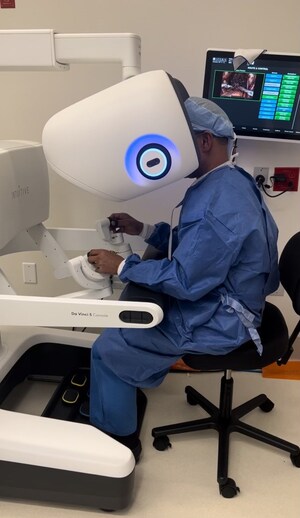Benefit of Adding Ibrutinib to Bendamustine/Rituximab as Frontline Treatment for Mantle Cell Lymphoma: First Phase III Trial Changing the Paradigm for the Care of Elderly Patients
John Theurer Cancer Center Investigators Participate in Large Pivotal International Study
HACKENSACK, N.J., June 3, 2022 /PRNewswire/ -- Hackensack Meridian John Theurer Cancer Center investigators participated in the large phase III multicenter SHINE study, which reported that using the drug ibrutinib (Imbruvica®) in combination with standard bendamustine and rituximab (BR) therapy as initial treatment for mantle cell lymphoma (MCL) slowed disease growth by 52% in older people newly diagnosed with the disease. The treatment could become the new standard of care for older people with MCL, who may not be able to tolerate more intensive treatment regimens. The study was published in the New England Journal of Medicine on June 3, 2022.
"The field of mantle cell lymphoma treatment continues to evolve. The standard of care for elderly patients — who account for more than half of all people diagnosed with mantle cell lymphoma and who are not eligible for high-dose therapy upfront — has most frequently been chemoimmunotherapy with bendamustine and rituximab. Over time, however, most patients relapse," explained Andre Goy, M.D., M.S., chairman and executive director of John Theurer Cancer Center, who led the center's participation in the SHINE study. "Ibrutinib was the first inhibitor of the BTK protein approved for MCL, and it has been a game changer for patients with relapsed or persistent disease. Logically, the next step was to bring it to the frontline setting, which was the subject of the SHINE clinical trial."
In this study, previously untreated MCL patients aged 65 and older were randomly assigned to receive six cycles of BR with either ibrutinib (261 patients) or a placebo (262 patients). Patients who responded to treatment received up to 12 additional doses of rituximab as maintenance therapy. Researchers compared progression-free survival (PFS, the time it took for the cancer to continue growing) between the two groups.
Adding ibrutinib to BR dramatically improved the outcome. After a median follow-up of 7 years, PFS was 6.7 years in the BR+ibrutinib arm versus 4.4 years for the BR+placebo group. Concluded Dr. Goy, "This is highly significant and could easily translate into BR+ibrutinib becoming the next standard of care."
Hackensack Meridian John Theurer Cancer Center is New Jersey's largest and most comprehensive center dedicated to the diagnosis, treatment, management, research, screenings, and preventive care as well as survivorship of patients with all types of cancers. The 14 specialized divisions covering the complete spectrum of cancer care have developed a close-knit team of medical, research, nursing, and support staff with specialized expertise that translates into more advanced, focused care for all patients. Each year, more people in the New Jersey/New York metropolitan area turn to John Theurer Cancer Center for cancer care than to any other facility in New Jersey. John Theurer Cancer Center is a part of the Georgetown Lombardi Comprehensive Cancer Center, an NCI-designated Comprehensive Cancer Center. Housed within a 775-bed not-for-profit teaching, tertiary care, and research hospital, John Theurer Cancer Center provides state-of-the-art technological advances, compassionate care, research innovations, medical expertise, and a full range of aftercare services that distinguish John Theurer Cancer Center from other facilities. For additional information, please visit www.jtcancercenter.org.
SOURCE Hackensack University Medical Center

WANT YOUR COMPANY'S NEWS FEATURED ON PRNEWSWIRE.COM?
Newsrooms &
Influencers
Digital Media
Outlets
Journalists
Opted In






Share this article